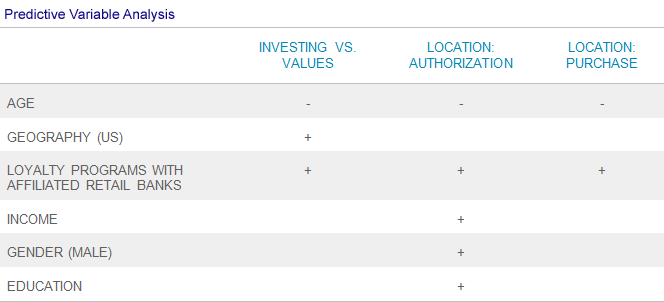Celent’s survey of US and UK customer tested potential messages that firms might provide to their customers, leveraging personal data and analytics. Importantly, the results show that most people don’t like receiving messages that implied firms accessed location or transaction data.
In the report Don’t Be Creepy: Analytics and the Client Experience, Celent focused on results of three hypothetical messages that Celent tested with survey participants. Participants were asked to rate each message on a scale of 1 to 7, 1 meaning that the participant would hate to receive it and 7 meaning that the participant would love to receive it. The messages were:
- Investing vs. Values: “Recent news stories suggest that one or more of your investments is not in line with your personal values — please call us to discuss (i.e., not meeting green objectives, testing on animals, involved in war, etc.).”
- Location Authorization: “We noted you have checked in at a location outside the country, so we have preauthorized your cards and accounts for use there.”
- Location Purchase: “The item you just purchased is available for 10% less at a short distance from your current location, click here for more details.”
Location-based messages were selected (even though they are typically seen as more relevant to retail banking) because of the growth of cash management services and the blending of retail banking and wealth management.
As many wealth managers increase their investments in analytics, these same firms need to address issues of customer privacy. Further, they must understand the customer characteristics that are likely to produce positive or negative reactions to messages.
The table provides a summary of the statistically significant correlations between customer characteristics and the three messages. Age is negatively correlated with attitude toward the message (i.e., the older the respondent, the less the respondent likes the message). This finding held across all messages. On the other hand, presence in a loyalty program predicted a more positive reaction to the messages. Respondents in the US were more likely to respond well for the Investing vs. Values message.

“Based on the data found in the survey, wealth managers are left with a number of lessons. First, the findings show the importance of segmentation. Segmentation drives the need for analytics, while analytics drives ever more sophisticated segmentation strategies. The ultimate goal of analytics is to arrive at a segmentation of one. But that will be an iterative process, fraught with trial and error,” notes Isabella Fonseca, Research Manager for Wealth Management and author. “This means that analytics and data management systems must be tightly integrated with CRM systems so that advisors, marketing teams, and product teams can create the necessary segmentation models to truly utilize the data they are receiving. It also means that wealth managers need to determine whether they are utilizing customer analytics for service improvements, product improvements, or both.”
This report draws on relevant data collected by Celent’s insurance practice and presented in the report Customers Don’t Want to Buy Insurance from Big Brother. This report will provide insight into current preferences of both US and UK customers as they relate to contextual messaging in wealth management. The report does a deep dive on attitudes toward the investment versus values message because tracking investments and understanding client values are often considered core functions of the wealth manager. Celent also provides insight into how wealth managers can make use of customer data and analytics in a productive way.





